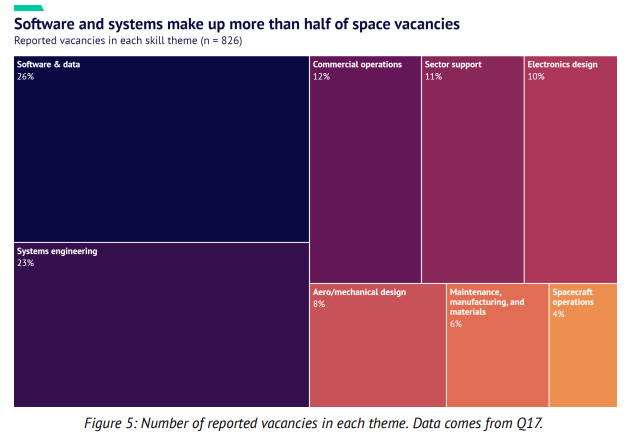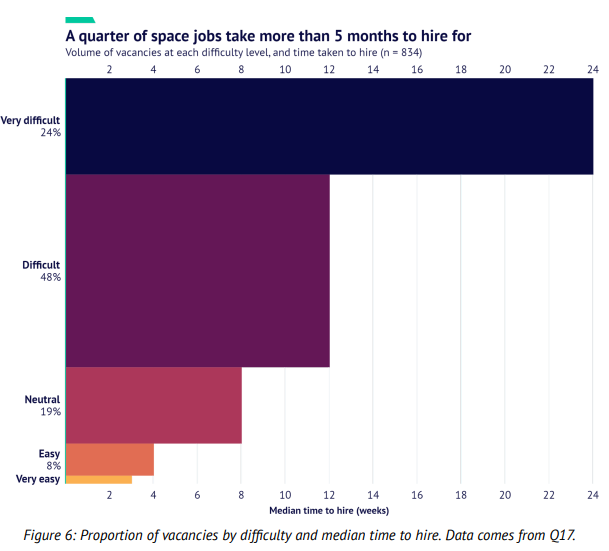Major Skills Shortage in UK Space Sector Says UKSA
14th Sep 2023
The UK space sector is facing a skills shortage with software, cyber security, artificial intelligence, and machine learning expertise in high demand. The gap was identified in the UK Space Agency’s (UKSA) Space Sector Skills Survey, which was collated alongside the Space Skills Alliance and know.space. After interviewing large and medium sized space companies, UKSA found that: “nearly all space organisations [are] experiencing some skills-related issues.” This is not hyperbole: 95% of companies reported some degree of difficulty in hiring.
The study also reported that 37% said they are missing expertise in software and data analysis. But unexpectedly, demand for skills in AI and machine learning was: “higher than any other technical area”. Therefore, UKSA is injecting £15 million of funding into education, skill building and outreach over the next two years to attract more people to STEM careers.
Falling Short of Industry Growth
The UK’s National Space Strategy in Action plan outlines the necessity for more talent in the space sector. It also noted the industry’s talent pool fell short of keeping in line with income growth over the past decade – which rose from £8.3 billion in 2009 to £17.5 billion in 2021.
Professor Anu Ojha, Director for Championing Space at the UK Space Agency, said in a statement: “our rapidly evolving space sector is home to ambitious organisations pursuing cutting edge science and technology, and generating significant investment opportunities. We’re committed to catalysing this growth and ensuring a strong pipeline of highly skilled professionals into the sector.”
The Need For Cyber, Data, & AI Experts

UKSA is anticipating a skills shift will be needed over the next three years to keep up with evolutions in artificial intelligence. 41% of the sector’s leaders believe this shift will increase demand for software and data professionals. According to UKSA however, this is already happening with: “software and data analysis accounting for half of all vacancies in the sector.” But surprisingly, a similar position, software and radio frequency engineering, is currently experiencing a drop. This is due to 72% of space organisations offering in-house training or successfully recruiting and retaining skilled workers.
The Future Of Data & AI In The Space Industry
When respondents were quizzed about the need to evolve their skills to keep up with advances in AI, half replied yes. A further 70% said AI and machine learning expertise will continue to be essential as the sector grows.
30% also said there will be an increase in demand for cyber security professionals over the next three years. Previously, UKSA pledged £7 million to protect the UK’s space digital infrastructure against cyber attacks. However, 15% of respondents said they are still: “feeling this gap now.”
Why Is The Space Industry Experiencing A Skills Challenge

Felt heavily by large space organisations, 65% reported they are currently fronting a skills gap within their workforce. 56% of smaller space companies also said they are feeling the pinch. Yet, this gap is still lower than “equivalent organisations across other business sectors” which is 86%.
Many respondents believe these challenges are due to recruitment obstacles, with 76% saying they are struggling to recruit talent with the necessary skills. However, 68% of respondents contend their biggest challenge is competition from other industries, closely followed by competition from other space companies (45%).
Retention issues spiked this year to 61% for large, and 71% for medium space companies, compared to 52% in 2020. UKSA said this is partially due to a 57% increase in headhunting. Whereas, 48% said lower pay levels were amplifying their retention difficulties.
Addressing These Challenges & Investing In STEM Education
Upskilling internally has proved to be an antidote, with 87% of organisations providing training to augment their workforce. Others have increased the amount of apprenticeships they offer by 30%, compared to 20% in 2020.
Some space companies said on-the-job training made up 92% of their upskilling efforts, compared to 84% utilising informal learning. 54% said they offer external training, while 30% said they sponsor tertiary education such as apprenticeships and degrees.
Nevertheless, UKSA said these provisions will not improve the skills gap, unless more people are attracted to STEM careers. As a result, UKSA injected £15 million into science, technology, engineering, and mathematics programmes, to: “inspire young people from all backgrounds to pursue STEM careers.” UKSA added: “[we will] empower teachers to include engaging space learning experiences in the classroom, and help space sector employers open pathways for more people taking their first steps into the industry.”







Thank you for your comment! It will be visible on the site after moderation.